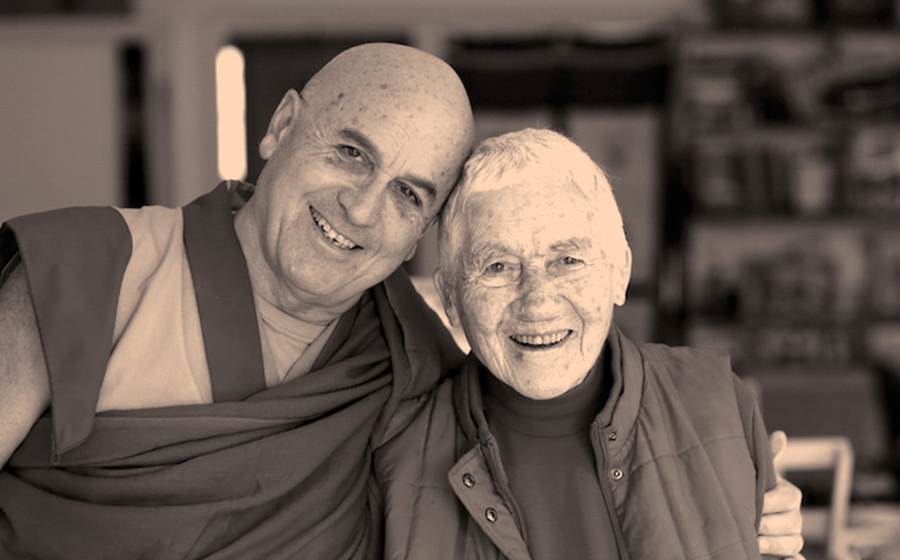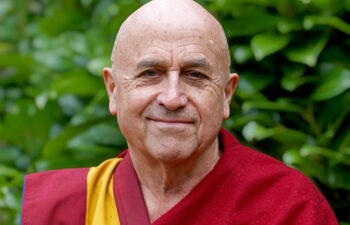


When I was young, my grandmother and mother often told me that kindness is the most admirable quality a human can possess. My mother demonstrated kindness constantly through her actions. Many other people I respected also urged me to be kindhearted. Their words and actions were a source of inspiration; they opened a field of possibilities beyond self-centered preoccupations and increased my wish to live a good, meaningful life. My spiritual masters emphasized the same approach. Since 1989, I have had the honor of serving as a French interpreter for His Holiness the Dalai Lama, who often states, “My religion is kindness.”
Over the years, I became increasingly passionate about researching altruism and compassion. I came to realize that altruism is neither a utopian ideal nor a luxury that we can afford only under the best circumstances. Rather, altruism is the only concept that harmoniously connects the economic challenges of the short term, our quality of life in the mean term, and the future environment in the long term. Selfishness will not do the job.
ALTRUISM IS NEITHER A UTOPIAN IDEAL NOR A LUXURY WE CAN AFFORD ONLY UNDER THE BEST CIRCUMSTANCES.
To foster altruism, we must first recognize the banality of goodness—the idea that most of the time, most of the seven billion human beings on our planet behave decently toward one another. Let us therefore assume that, besides a few maniacs and lunatics, some of whom might even wield temporary power, we all want a better world.
In many respects, the world is faring better. Thanks to the United Nations Millennium Development Goals, the number of people who live below the poverty line has dropped from 1.5 billion to 750 million in twenty years. If we don’t ruin the environment, extreme poverty could even disappear by 2030. The number of countries that have abolished the death penalty has multiplied by thirteen; the number of children with no schooling has been reduced by half over two decades; and the number of authoritarian regimes has diminished from ninety in 1975 to twenty today. The mortality rate of malaria has decreased by sixty percent in fifteen years, saving more than six million lives, thanks in part to the exceptional work of Ray Chambers, the United Nations’ special envoy for Health in Agenda 2030 and for Malaria.
Despite these improvements, environmental degradation is undoubtedly the major challenge of the twenty-first century and will have a great impact on the fate of future generations. This is no time to lose courage. We must act on an individual level by engaging ourselves with perseverance in the service of humanity and the planet. On a social level, we must address inequalities by fostering altruistic cooperation. At the level of national and international institutions, we must ratify binding environmental resolutions.

For a better future, we must dare to embrace altruism. Dare to say that real altruism exists, that every one of us can cultivate it, and that the evolution of cultures can favor its expansion. We must dare to teach altruism in schools as a precious tool that enables children to realize their natural potential for kindness and cooperation. Dare to assert that the economy cannot content itself with the voice of rationality and strict personal interest—it must also listen to the voice of caring and make it heard. We must dare to take the fate of future generations seriously, changing the way we exploit our planet today, as it will be their home tomorrow. Finally, we must dare to proclaim that altruism is not a luxury but a necessity.
As the environment approaches a dangerous point of no return, we still have the power to overcome these challenges by fully engaging our extraordinary ability to cooperate with each other and investing our energy into solutions that will improve the state of the world. As the philosopher and mathematician Bertrand Russell once said, “The only thing that will redeem mankind is cooperation.” In any case, it is now too late to be pessimistic. With their emphasis on kindness, my grandmother and mother were right indeed.

Matthieu Ricard is a PhD in cell genetics who became a Buddhist monk and has studied Buddhism in the Himalayas for the last 50 years. He is a humanitarian, an author, and a photographer. His books include Altruism: The Power of Compassion to Change Yourself and the World. He devotes all the proceeds of his activities to humanitarian projects in Asia, through Karuna-Shechen, the organization he co-founded, which benefits over 450,000 people every year.
Get the latest news and stories from the Rubin, plus occasional information on how to support our work.